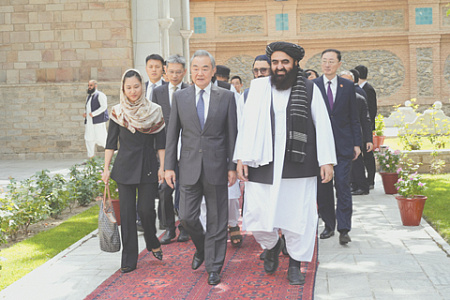
China is moving decisively to fill the void left by the United States in Afghanistan, signaling its intent to integrate the Taliban-led nation into its colossal Belt and Road Initiative (BRI). Beijing’s strategy aims to leverage infrastructure development and economic partnership to stabilize the war-torn country while securing its own strategic interests, shifting Afghanistan from a geopolitical battleground to a potential economic corridor.
A significant step has already been taken with the extension of a contract for a Chinese company to operate the Mes Aynak copper mine, one of the world’s largest untapped deposits. This move was solidified during a trilateral dialogue in Kabul between Chinese Foreign Minister Wang Yi, his Taliban-appointed counterpart Amir Khan Muttaqi, and Pakistani officials. The discussions focused on deepening economic ties, particularly in resource extraction, and formally connecting Afghanistan to the vast BRI network.
While Beijing frames its engagement in terms of mutual development, Afghan officials have been candid about China’s motives. Acting Foreign Minister Muttaqi publicly acknowledged that Beijing aims to exploit Afghanistan’s rich mineral wealth and use its strategic location to amplify China’s influence on the world stage. This alignment of interests has paved the way for Beijing to formally recognize the Taliban regime and appoint an ambassador to Kabul, lending the government a degree of international legitimacy it has struggled to obtain.
However, this ambitious economic vision is shadowed by severe security threats. The Taliban government has proven unable to fully suppress extremist groups operating within Afghanistan, including those that have launched attacks on diplomatic missions in Kabul. These factions also pose a significant danger in neighboring Pakistan, where they have repeatedly targeted Chinese personnel and infrastructure projects associated with the BRI, creating a volatile and high-risk environment for Beijing’s investments.
Further complicating the situation is a spiraling humanitarian crisis at the Afghanistan-Pakistan border. Islamabad has initiated the forced deportation of over a million Afghan refugees, including many who were born in Pakistan or held valid registration cards. This mass expulsion, which has also been reported from Iran, is creating chaos and immense human suffering, sending shockwaves through a region already grappling with instability.
The United Nations has sharply condemned the deportations as a violation of international law. Kaiser Afridi, a spokesperson for the UN refugee agency, urged Pakistan to adopt a more humane and orderly approach, highlighting that the crisis undermines regional stability. For China, this deep-seated friction and humanitarian disaster represents another critical obstacle, demonstrating that its economic blueprint for Afghanistan is fraught with complex geopolitical and human challenges.
